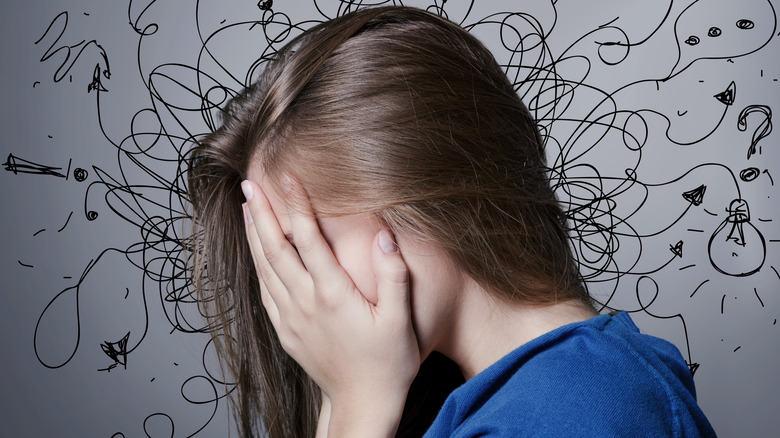Anxiety is a common emotion that encompasses feelings of uneasiness, dread, and fear. According to MedlinePlus, it may cause physical symptoms such as an increased heart rate, sweating, and tense muscles. Anxiety can be a normal response to stress. It’s a coping mechanism that helps us focus, so we can tackle the situation causing the anxiety. However, when anxiety sticks around or becomes a constant companion, then you might have an anxiety disorder.
According to the National Institute of Mental Health, the primary distinctions between typical anxiety and anxiety disorders are the duration of the anxiety and the extent to which it impacts daily life. People with anxiety disorders feel anxious most of the time, even if they aren’t dealing with something that would typically cause anxiety. Their anxiety is so intense that it causes problems with their relationships, career, and health.
There are three types of anxiety disorders: generalized anxiety disorder, panic disorders, and phobia disorders. Several more specific diagnoses fall under each of these categories. People with generalized anxiety disorder feel restless and irritable much of the time. They have intense worries and fears that impede daily tasks and interactions, and they often have trouble sleeping. People with panic disorders have intense panic attacks that can be triggered by a specific event or happen seemingly without cause. Those with phobia disorders have an intense fear of a specific thing or situation.
Luckily, there are several ways to manage anxiety on your own or with the help of professionals.
Meditate
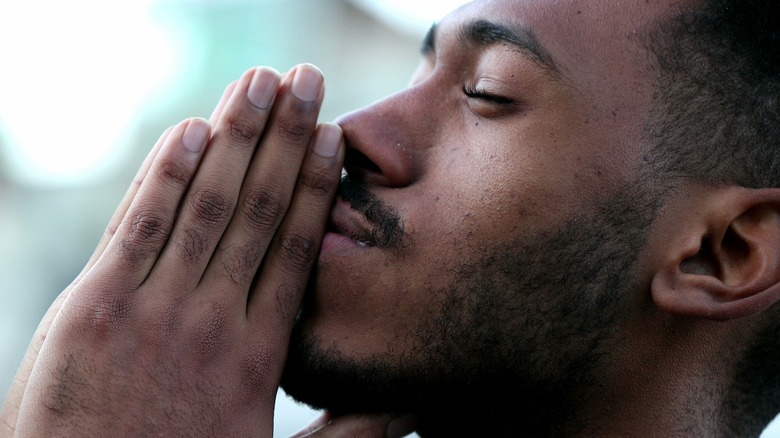
Literally hundreds of studies have been performed on the effectiveness of meditation as a treatment for psychiatric disorders. A meta-analysis of 142 studies on the subject revealed that individual studies consistently demonstrated a link between meditation and anxiety reduction (via Clinical Psychology Review). Their review concluded that meditation can be just as effective as other psychiatric interventions for anxiety.
The Mayo Clinic notes that meditation is a particularly accessible treatment option for anxiety because it can be implemented by anyone, anywhere, at any time throughout the day. Meditation can be practiced in numerous different ways. At the core of every practice is the concept of observing and letting go of conscious thought, focusing the mind, slowing down the body, and achieving a relaxed state. You can practice meditation by sitting quietly and focusing on your breath, focusing on the sensations in your body, listening to a guided meditation, repeating a mantra, or engaging in a meditative movement practice like yoga, tai chi, or qi gong.
Meditation can help to relieve anxiety by teaching you to detach from your anxious thoughts and focus your mind on achieving a relaxed state. It can also help you process difficult thoughts and feelings so that you can reach a better understanding of your inner self. During times of acute anxiety, practicing meditation can interrupt anxious and negative thought processes and give you the space to calm down.
Move your body
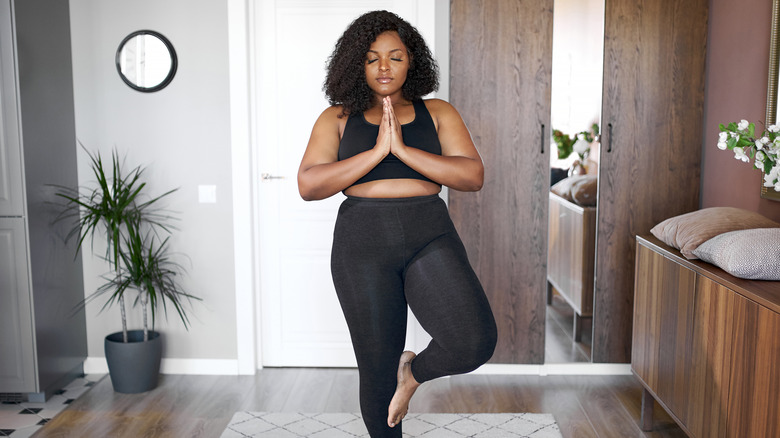
Physical activity is another proven method for reducing anxiety. In an article for Harvard Health, Dr. John J. Ratey stated that he always recommends exercise to his patients with anxiety. Ratey explained that exercise is so good at relieving anxiety because it activates the parts of the brain responsible for responding to threats both real and imagined. Activating these regions helps you respond to the fear and dread brought on by anxiety. Exercise also triggers the release of brain chemicals like serotonin, gamma aminobutyric acid (GABA), brain-derived neurotrophic factor (BDNF), and endocannabinoids, which help calm anxiety.
Ratey also emphasized that consistent exercise is best, but any amount and type of exercise will help. The best approach is to choose something you like to do so you’ll actually want to do it when you’re anxious. A meta-analysis of studies on exercise and anxiety that there was a strong relationship between increased physical activity and anxiety reduction (via Depression & Anxiety). The review found that exercising worked to reduce anxiety in people of all ages, and that exercise could even prevent the onset of anxiety symptoms.
So, when you start to feel anxious, go for a walk or a run, hit up an exercise class, or roll out your yoga mat!
Spend time outside

Impact Photography/Shutterstock
For an extra boost of anxiety relief, get your body moving out the door. According to the American Psychological Association, spending time in nature on a regular basis improves mood, lowers stress, and reduces the risk of psychiatric disorders. Scientists aren’t exactly sure why nature does so much good for our bodies and our brains, but there are a few theories. Some experts believe that humans have an inherent need to connect with nature because we evolved outside. Others believe that being in nature triggers a physiological response that reduces stress. Still others believe that nature restores our cognitive abilities, which leads to lower stress. Regardless of the mechanism, research clearly shows that time in nature improves anxiety.
A review of research about spending time outside to reduce anxiety found that walking outside triggered multiple physiological responses including reduced cortisol production, a lower blood pressure and heart rate, and activation of the parasympathetic nervous system. All of these responses lead to a decrease in stress and anxiety.
So, you don’t even need to move your body too much while you’re outside. You can just find a nice view, plop down, and breathe in some fresh air.
Journal
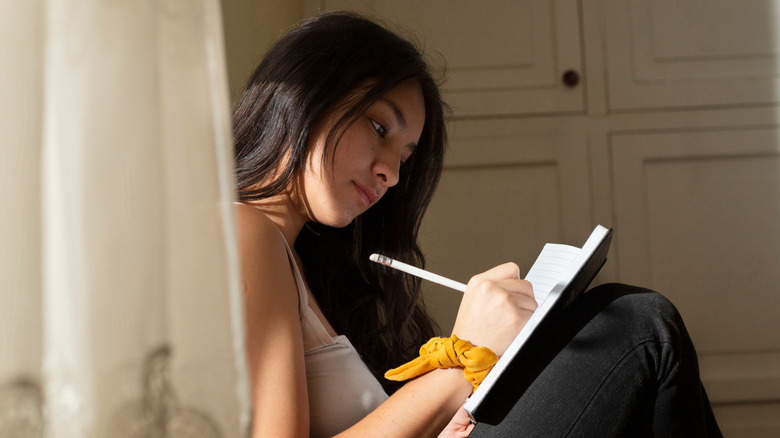
Fernanda Reyes/Shutterstock
According to Verywell Mind, journaling is a particularly effective way to reduce anxiety because it provides a method for processing thoughts and feelings. There are a few different methods that work particularly well for anxiety. One is to use journaling as a tool for challenging thoughts and feelings caused by anxiety. Write down all your negative thoughts, worries, and fears, and read them once you’re done. As you read, call on the logical part of your brain to assess whether these thoughts, worries, and fears are realistic. If they aren’t, you can write about ways to think about these things in a more realistic way. If they are realistic, then you can write about a plan for dealing with them that relies on your strengths.
Another method is called freewriting. The goal of freewriting is to just get all your negative thoughts, worries, and fears out of your head. Anxiety often leads to rumination, which is obsessive thinking about worries and fears. Putting these worries and fears on paper can interrupt the rumination process. When you’re done, read what you’ve written and reflect on it.
Keeping a thought diary is another great way to gain awareness of how anxiety is impacting your thoughts and feelings. Every time you feeling anxious or have a negative thought, make a quick note in your journal or take a moment to do some freewriting. This can help you identify thought patterns, worries, and fears that you continually struggle with.
Try aromatherapy
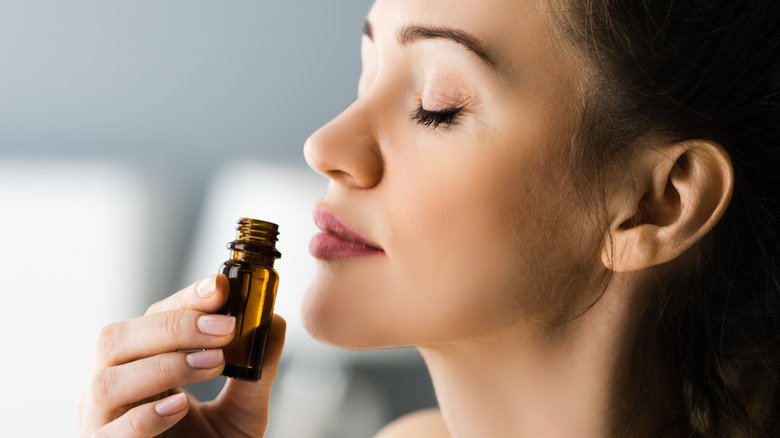
Andrey Popov/Shutterstock
Extensive research has been done on using aromatherapy to reduce anxiety. A meta-analysis of studies on the effectiveness of lavender oil as a therapy for anxiety found that it has many of the same effects as pharmaceuticals prescribed for anxiety without any of the common side effects. Lavender oil produces the same calming effects as anti-anxiety medications, but it doesn’t cause sedation and there’s no chance of dependence. The review also found that consistent use of lavender oil aromatherapy gave relief quicker than most anti-anxiety medications.
One study found that inhaling rose water oil greatly decreased anxiety in patients undergoing hemodialysis (via Nephro-Urology Monthly). Another study found that adolescents who wore an aromatherapy necklace so they could inhale an essential oil when they were stressed experienced much less stress than those who weren’t using aromatherapy (via Journal of Korean Academy of Nursing). A 2024 meta-analysis of the studies done on aromatherapy and sleep found that aromatherapy can also improve sleep quality, which plays a major role in anxiety reduction.
According to Healthline, various essential oils including valerian, basil, bergamot, chamomile, vetiver, ylang ylang, frankincense, sage, patchouli, geranium, lemon, marjoram, and fennel may help to reduce the symptoms of anxiety. Each essential oil targets different symptoms of anxiety, so do your research on which one will work best for you. The most common ways to use essential oils for aromatherapy are via a diffuser to create a mist or by applying them directly to the skin.
Cut your caffeine intake
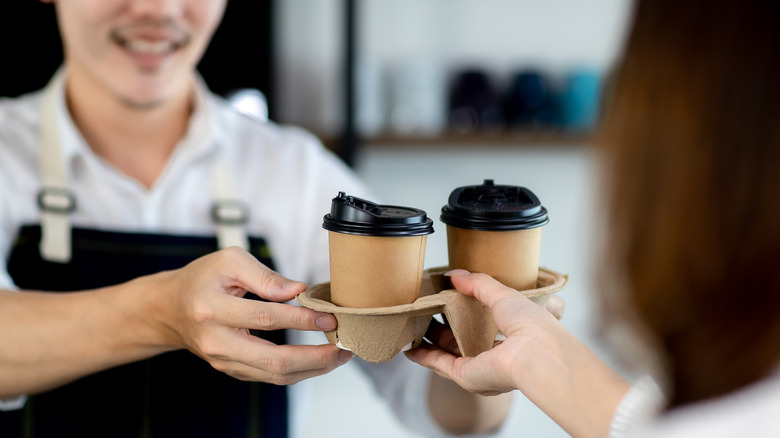
Bangkok Click Studio/Shutterstock
The relationship between caffeine intake and anxiety has been extensively researched. However, the conclusions are mixed.
One review of existing studies on caffeine and anxiety found that caffeine consumption created anxiety symptoms in people with and without anxiety disorders. Another review of existing studies found that people with anxiety disorders were much more likely to experience symptoms if they consistently consumed caffeine. One study published in the Journal of Abnormal Psychology found that even two or three cups of coffee a day, equivalent to 150-300 milligrams of caffeine, increased anxiety, depression, and hostility.
On the other hand, a study published in the Journal of Psychopharmacology found that the relationship between caffeine intake and anxiety was negligent when other factors were taken into account. Initially, their results supported the theory that caffeine increases anxiety. However, when they adjusted the data to account for demographics, diet, and lifestyle factors, the impact of caffeine on anxiety disappeared. Another study published in the medical journal Psychiatry Research found no correlation between anxiety symptoms and caffeine consumption. The study also concluded that anxiety symptoms did not increase when caffeine intake increased.
It’s not totally clear whether cutting out caffeine reduces anxiety for everyone. However, research suggests that some people with anxiety do benefit from cutting their caffeine intake or avoiding caffeine entirely. If you feel like caffeine has a big effect on how you feel, try going without it.
Stay fueled throughout the day
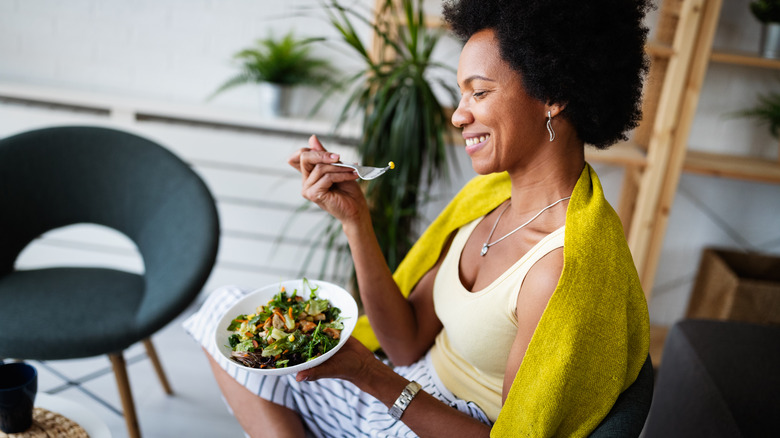
NDAB Creativity/Shutterstock
Are you one of those people who get totally hangry? Turns out there’s a physiological reason for that! According to Psychology Today, changes in blood sugar triggered by not eating can cause anxiety and depression. When your eating patterns aren’t consistent for an extended period of time, you can become hypersensitive to changes in blood sugar. This creates even more anxiety.
A 2024 study done by researchers at the University of Guelph found that blood sugar drops led to increases in the stress hormone cortisol in rats. The researchers told Science Daily that their research suggests nutrition should be a part of treatment plans for anxiety. Another study found that cortisol dysregulation had a major impact on food cravings (via Obesity). This suggests that chronic stress can also impact our eating habits. When we don’t eat regularly enough, our cortisol gets out of whack, which makes us anxious. This in turn causes food cravings, which makes us even more anxious.
You can break this cycle by staying fueled throughout the day. Psychology Today suggests eating snacks throughout the day or eating small meals every two to three hours to keep your blood sugar consistent throughout the day. The ideal meals and snacks combine protein, fats, and complex carbs. Simple carbs will actually spike your blood sugar and then send it crashing, worsening the problem. If eating throughout the day doesn’t help your hangry anxiety, check in with your doctor.
Laugh!
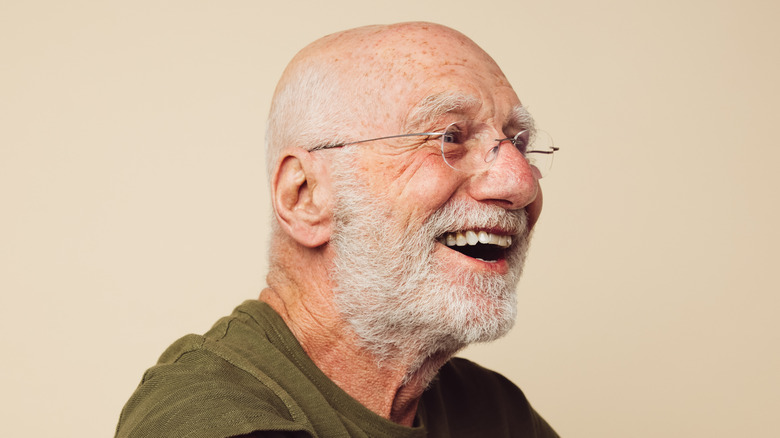
Jacob Lund/Shutterstock
When you’re anxious, it’s probably difficult to find something to laugh about. However, a laugh might be just what you need to vanquish your anxiety.
According to research published in the Tohoku Journal of Experimental Medicine, laughter reduces the amount of stress hormones in the blood. It also releases dopamine, serotonin, and endorphins, the key hormones responsible for mood regulation. A 2024 study on the effects of laughing yoga on stress found that the practice actually changed the way the brain produced cortisol in response to stress. This suggests that laughter could prevent stress, aside from treating it.
The Mayo Clinic suggests actively cultivating a sense of humor to help with anxiety. Try laughing yoga, go to a comedy show, watch a funny movie, or call a friend who always makes you laugh. The laughter will probably feel forced at first, but if you can relax a bit, the belly laughs will eventually come quickly and naturally.
Get a hug!
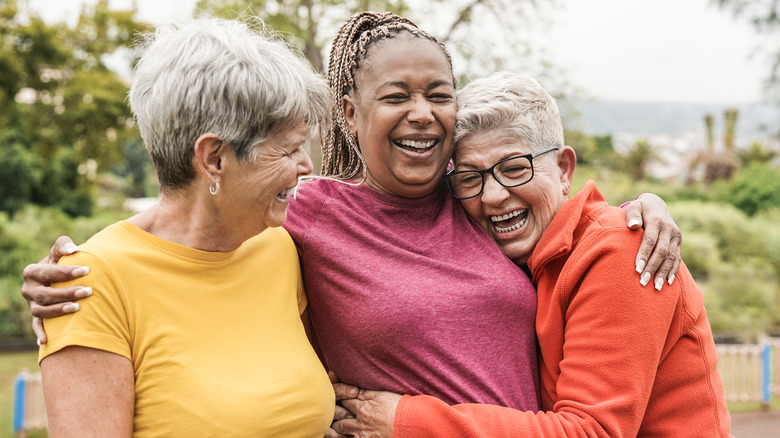
Sabrina Bracher/Shutterstock
We all know that getting a really good hug feels great, but did you know that hugs are actually great for your health? According to WebMD, getting a hug from someone you love releases oxytocin, a feel-good hormone that helps you calm down. Hugs can also bring down cortisol levels and blood pressure, which helps to relieve stress. And lower stress levels mean reduced anxiety.
One study published in the medical journal PLoS One investigated the impact of hugs on mood and conflict patterns. The researchers found that people who received more hugs throughout the day were less likely to engage in conflicts and were less bothered by conflicts they did have. This suggests that hugs can reduce anxiety by lessening the impact of conflict, which often contributes to anxiety. Meanwhile, findings published in the medical journal Psychological Science found that touch is a powerful tool for fighting fears. In that study, people who were touched kindly before filling out a questionnaire about existential fears (e.g., the fear of death) felt less anxious even though they were being asked to engage with difficult concepts. Their research suggests that touch may be a powerful addition to treatment programs for anxiety.
So, when you’re feeling really anxious, asking for a quick squeeze might bring you some relief.
Focus on better sleep
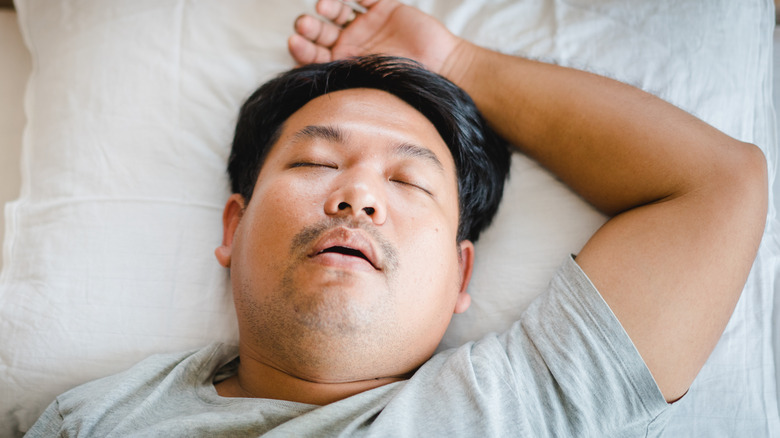
MIA Studio/Shutterstock
Sleep is important for just about every aspect of our lives, and anxiety is no different. According to The Sleep Foundation, anxiety is often negatively intertwined with sleep. Fears, worries, and racing thoughts caused by anxiety make it harder to fall asleep and get quality sleep. Fatigue from lack of sleep then makes anxiety worse, kicking off a reciprocal cycle of anxiety and insomnia.
The connections between sleep and anxiety have been extensively researched. One study published in the Journal of Neuroscience found that fatigue was associated with increased anticipatory responses, which increased overall anxiety. Basically, being overly tired keeps us in a state of anticipation, constantly bracing for what might happen. Another study found that anxiety was a strong contributor to poor sleep patterns and quality (via Nature and Science of Sleep). Research also suggests that irregular sleep patterns can create mental health issues like anxiety. A 2024 study performed on interning med students found that changes in the students’ sleep schedules significantly changed their overall mood for the worse.
So, science suggests that improving sleep habits and quality is essential to managing anxiety. Luckily, there are a lot of things you can do to improve your sleep. Healthline suggests limiting caffeine and alcohol consumption, implementing a pre-bedtime routine that helps you relax, exercising regularly, investing in a comfortable mattress and pillow, avoiding screens before bedtime, and taking supplements to support better sleep under your doctor’s supervision.
Talk to someone
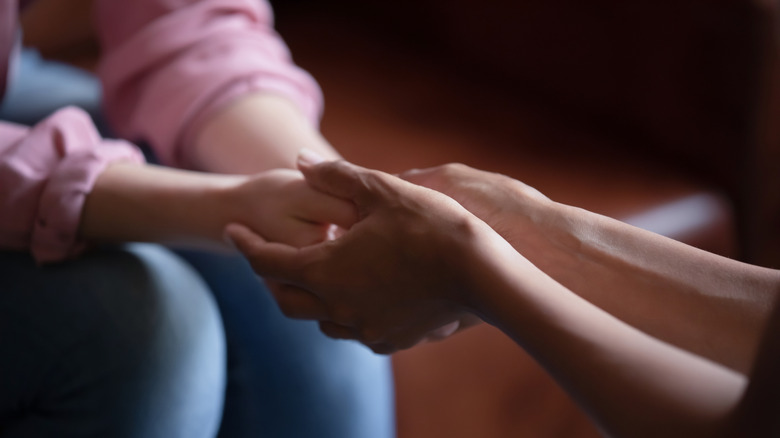
Fizkes/Shutterstock
Many people find that talking to someone — a friend, a family member, or a therapist — significantly reduces anxiety. According to Psychology Today, neuroscience has proven this anecdotal experience. Studies have found that talking about anxiety with someone significantly reduces both stress and emotional distress.
One study published in Psychological Science found that the act of naming a feeling reduced the responses in the amygdala and the limbic system, the parts of the brain involved in negative emotions. This research suggests that simply putting a word to your feelings, like “I’m feeling a lot of fear right now,” can reduce your brain’s reactivity to that emotion.
Talking through negative emotions has been the basis of psychotherapy for decades. So, talking to a therapist is always a great option. However, you don’t necessarily have to talk to a professional to get the benefits of talking about your feelings. Talking to a trusted loved one can provide the same relief.
Learn about your anxiety
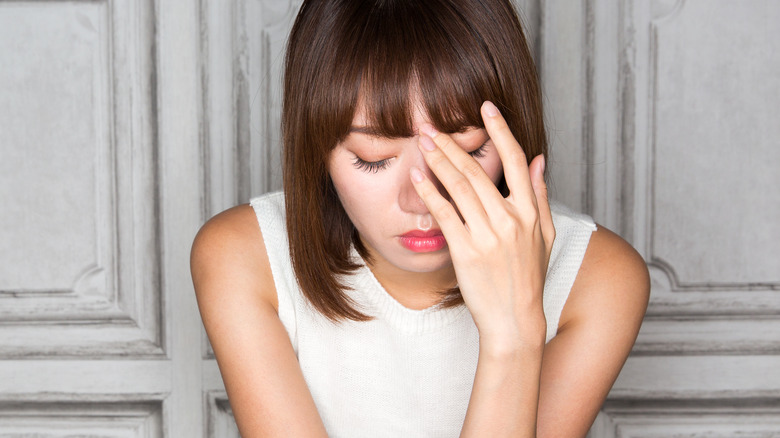
Kei907/Shutterstock
One of the most powerful tools for managing your anxiety is self-examination, per Healthline. When you feel anxious, take a moment to examine the situation. Write down or make a mental note of what happened right before you started to feel anxious, what you’re thinking, and the exact feelings you’re having. Do this whenever you feel anxious and see if any patterns emerge. Once you’ve identified situations or things that trigger your anxiety, you can work on avoiding those things if possible or developing coping mechanisms so you can face these things without as much anxiety.
Sometimes, it can be really hard to identify anxiety triggers on our own. It may feel like the anxiety just comes out of nowhere. Working with a therapist might help since they can give you an outside perspective and they’re experienced at identifying anxiety triggers.
According to Healthline, common anxiety triggers include health concerns, worries about loved ones, finances, lack of sleep, overconsumption of caffeine, poor diet, certain medications, worries about the state of the larger world, being overstimulated, fears of losing a loved one, feeling out of control, and perfectionism. Though these are common triggers, anxiety triggers are highly individual. So, you’ll need to do the work to figure out your specific triggers.
Practice acceptance and let go
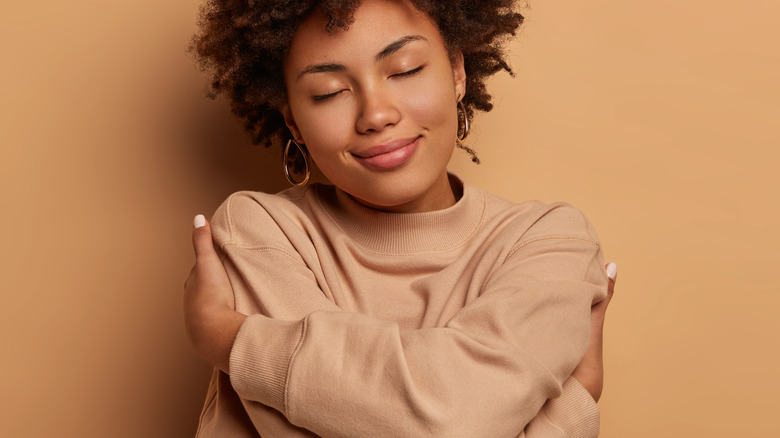
Wayhome Studio/Shutterstock
Perfectionism and feeling out of control are two very common anxiety triggers. According to Verywell Mind, perfectionism inherently leads to unrealistic expectations, which leads to anxiety about living up to these standards. Our anxiety is reinforced when we inevitably fail to live up to our own high standards. Perfectionism is also highly associated with negative thought patterns.
According to psychotherapist William Berry, one of the ways that we try to cope with the worries and fears caused by anxiety is to attempt to control the people and situations we’re anxious about (via Psychology Today). Unfortunately, controlling these people and situations usually isn’t feasible, which causes more anxiety. Research suggests that accepting life as it is and letting go of the need for control can provide significant relief. One study published in the medical journal Behavioral Modification compared traditional cognitive therapy to Acceptance and Commitment Therapy (ACT), a behavioral therapy focused on fostering acceptance. That study found that ACT was as effective at reducing anxiety as traditional cognitive therapy. A case study on ACT found that the therapy significantly reduced experiences of anxiety and distress (via Cognitive and Behavioral Practice). Another study that compared ACT to cognitive behavioral therapy (CBT), a common treatment protocol for anxiety disorders, found that ACT was just as effective as CBT at reducing anxiety.
So, when you feel particularly anxious, try reminding yourself that the situation is what it is — and that it’s not up to you to change it.
Try acupuncture
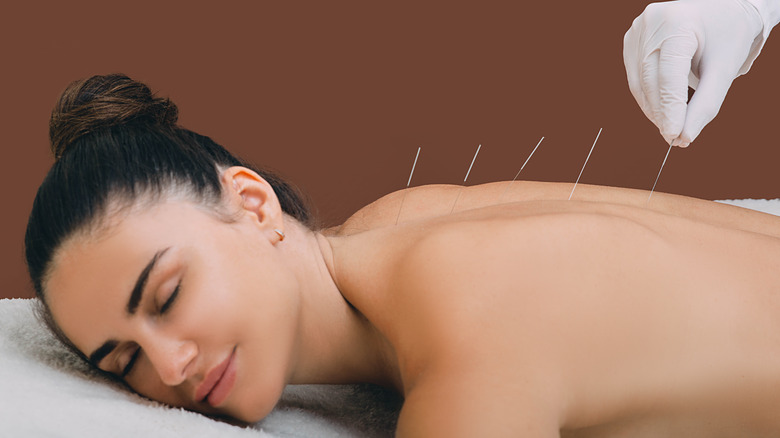
Peakstock/Shutterstock
Acupuncture works by inserting thin needles in specific points on the body. Elizabeth Trattner, a board-certified doctor of Chinese and integrative medicine, told Health that acupuncture is based on the Chinese concept of qi, which is essentially the energy within our bodies. Qi flows along specific tracks in the body — and when the flow of qi is disrupted, physical and mental illness result. Acupuncture restores the flow of qi, restoring physical and mental health.
If that sounds a little too woo-woo for you, the explanation that Daniel Hsu, a doctor of acupuncture and Oriental medicine out of New York City, gave Everyday Health might resonate with you. Hsu says that qi is the traditional Chinese understanding of the metabolic processes constantly happening throughout our bodies. The pressure points used in acupuncture correlate with nerves throughout the body. When the needles are inserted near these nerves, it triggers the body to produce chemicals and hormones that promote healing.
Ashley Flores, a licensed acupuncturist practicing in Chicago, told Health that the science behind acupuncture as a treatment for anxiety is simple. Anxiety is often caused by a hypersensitive central nervous system, and acupuncture helps regulate the central nervous system by triggering the production of feel-good chemicals and hormones that reduce anxiety and stimulating the parts of our brains responsible for regulating the central nervous system.
Consider medication
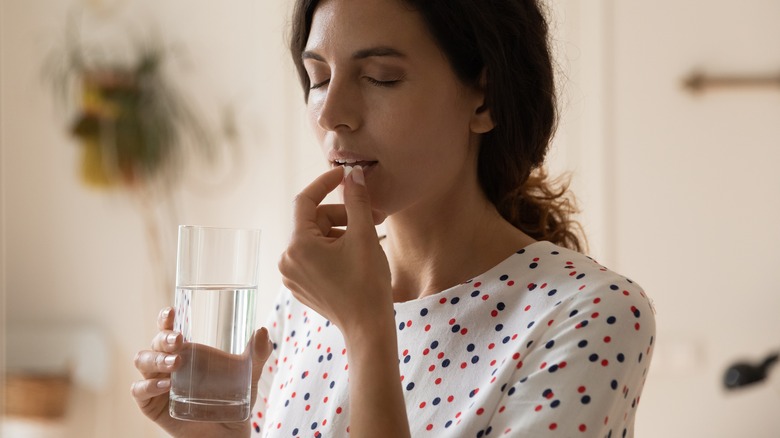
Fizkes/Shutterstock
Though there are myriad ways to manage anxiety, anti-anxiety medication is sometimes necessary to improve and maintain one’s quality of life. Dr. Ken Duckworth, the chief medical officer for the National Alliance on Mental Illness (NAMI), told Everyday Health that anxiety is different for each person, so what works for one might not work for another. He emphasized that working with your doctor to find the right balance of psychotherapy, medication, and exercise is the ideal way to treat anxiety.
If your doctor thinks medication will help your anxiety, there are a few different kinds of medication they might suggest. Selective serotonin reuptake inhibitors (SSRIs) are antidepressants that are commonly prescribed for anxiety disorders. These medications work by increasing the amount of serotonin available to the brain. Serotonin-norepinephrine reuptake inhibitors (SNRIs) are another type of antidepressant commonly prescribed for anxiety. Benzodiazepines are anxiety medications that work by regulating neurotransmitters in the brain, producing a sedative effect. Benzodiazepines are incredibly effective for treating anxiety, but can be highly addictive. Thus, they should be used sparingly and for short periods of time to relieve severe anxiety.
Other medications like beta-blockers and specific types of antihistamines have also proved effective at treating some of the symptoms of certain anxiety disorders. Be sure to give your doctor a comprehensive overview of your symptoms so they can decide which medication is the best fit for you.

